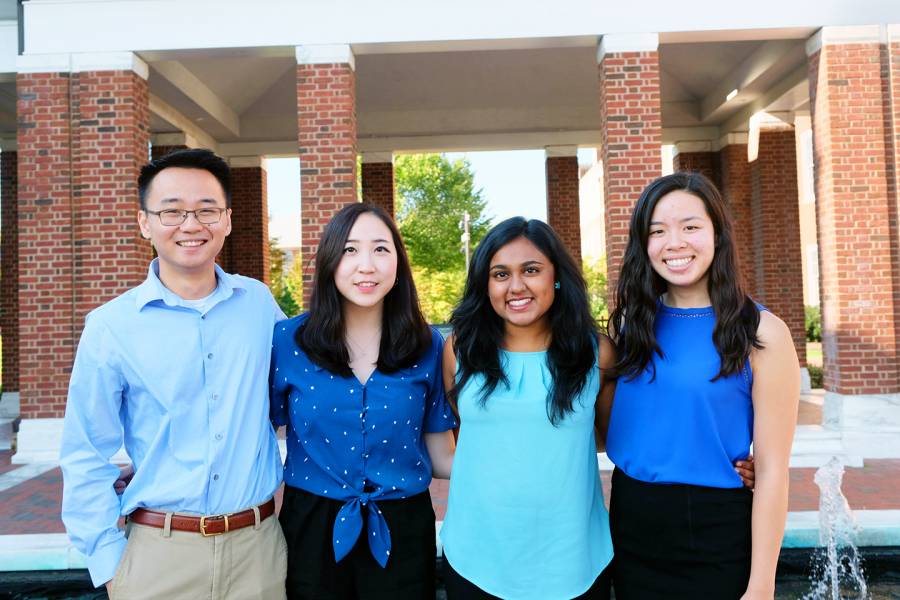It's not uncommon for college students to balk at the idea of group work, but Johns Hopkins engineering student Sarah Lee says she can't imagine finding the success she has with her award-winning medical device company without help and input from her team.
Her company, Relavo, has designed a potentially lifesaving product called PeritoneX to address the high infection rate in patients using peritoneal dialysis to treat kidney failure. The team has won more than $41,000 in funding over the past year and was recently named a finalist in the National Collegiate Inventors Competition and showcase, which takes place Wednesday at the U.S. Patent and Trademark Office headquarters in Alexandria, Virginia.
The idea began as a design team project when Lee was a Johns Hopkins undergraduate student.
"The opportunity to actually own your work in design team motivates you more than a grade ever could, and when you bring a group of people who are all equally devoted to a project rather than a grade together, it makes for an incredible experience," says Lee, now a graduate student in the university's Department of Biomedical Engineering.
Video credit: National Inventors Hall of Fame
Lee recruited a team of five students to work together on the yearlong project beginning in the spring of 2017. As part of the class, the design teams heard from Johns Hopkins Hospital physicians, who described unsolved clinical problems.
Lee seized the opportunity to work with Alicia Neu, a pediatric nephrologist at Johns Hopkins Hospital who pitched the idea of working on a way to address the high infection rate associated with peritoneal dialysis. The issue seemed manageable, there had been no innovation in the field for decades, and the challenge excited Lee, she says.
For patients living with kidney failure, peritoneal dialysis—where a surgically implanted catheter extends into the abdomen's lining through a series of tubes and fluid bags to remove waste from the patient's body each night—is an increasingly popular treatment option that can be done at home. When patients or their caregivers administer peritoneal dialysis at home, however, bacterial infections can occur if the connecting pieces become contaminated. Peritonitis occurs in more than 30% of patients receiving peritoneal dialysis and can be fatal.
Currently, if patients notice infection, they are instructed to discard the contaminated tubing or disinfect it with antimicrobials or antiseptics. PeritoneX removes the burden of disinfection from patients and instead disinfects tube ends directly at the source of contamination. Rather than patients trying to connect the tubes, they instead connect them to the PeritoneX device, which releases and automatically withdraws a preloaded antimicrobial.
The Relavo team is still fine-tuning the device, but team members envision a product that is small and noninvasive, ideally fitting in the palm of a patient's hand. Team members expect to finish product development in the next six to 12 months, then move toward validation testing, gaining approval from the Food and Drug Administration, and conducting clinical trials.
Tejasvi Desai, a Hopkins junior studying biomedical engineering, joined Relavo two years ago and says being part of the team has helped her gain skills that she wouldn't have otherwise. She's served as a team technician and businesswoman, and also—unexpectedly—a storyteller.
"I've really come to understand the importance of crafting a relatable story," she says. "To really reach people, you have to go beyond describing what the device does and talk about why it's useful and how it impacts people on a very basic level."
Though the design team class only lasts one year, the original group registered for a pilot advanced course to continue their project independently because they were so passionate about the work. Lee credits FastForward U; the team's faculty adviser, Elizabeth Logsdon; and the university overall for supporting the team's ambitions.
After exhausting the $2,500 allotted to their project as part of the design team course, the team started applying for grants offered by the university, beginning with the Ralph S. O'Connor Undergraduate Entrepreneurship Fund and other funding available through FastForward U. Relavo has also won prestigious external grants, including $5,000 from VentureWell's 2019 Spring E-Team Grant Program and $3,500 at Texas Christian University's Richards Barrentine Values and Ventures Competition in April.
By branching out beyond Hopkins, team members have met mentors, received important feedback at business plan competitions, and gotten a boost in confidence. Lee says she initially found the experience overwhelming but believes she's grown exponentially through the process.
"Being viewed as a leader by my peers and having to learn how to manage let me gain confidence and skills, such as how to delegate and not getting stuck in the weeds," she says.
"You don't get a grade at work," Lee adds. "Your successes and milestones are measured by how well you can manage others, how you get others onboard with your plans, and how you raise funds for your initiatives. Design team teaches you how to work in real life."
Posted in Science+Technology
Tagged biomedical engineering, undergraduate research, startups, design competitions









